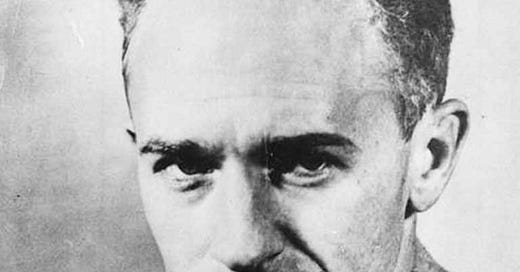April 3, 1935 - Where Men Are Men
‘Average man’ of the Southwest beginning to doubt efficacy of New Deal, but all are agreed on personal integrity of Roosevelt
Washington Daily News — Wednesday — April 3 1935 Page 17
WHERE MEN ARE MEN By ERNIE PYLE
THINGS have come to a pretty pass in this country when a Washington newspaperman on vacation, trying to get away from it all, as they say in books, finds that everywhere he goes people insist on talking to him about the New Deal and the state of the nation and the social system.
“What is it all coming to?” has become as ordinary a remark as, “How you doin’?”
For two months I have been wandering about the Southwest, trying in vain to have nothing heavier on my frail mind than the distance from Gila Bend to Yuma, or how soon the desert flowers start to bloom.
But everywhere it was “What do the people in Washington think of the New Deal now?” and “How are we going to pay for all this money that’s being spent?” and “What does the Administration plan to do next?”
I told them I knew all the answers, but wasn’t allowed to tell. But that didn’t stop them. After the questions, would come a flood of opinion…”Well, let me tell you what I think about it…” and what they thought about it wasn’t very encouraging.
It is true that the impressions which I so voluntarily gathered do not represent any true cross-section of public opinion. I didn’t talk with any millionaires, and I didn’t talk with any knights of the road (altho you can count a lot of them on top of any SOuthern Pacific freight you see). My conversations were largely with the great “average man,” who is very genuinely concerned about, and very earnestly trying to solve, all our social problems.
● ● ●
THIS section of public opinion seems to have changed during the past year, and the feeling is not any too favorable toward the Roosevelt Administration. Whereas a year ago there was confidence and enthusiasm for the New Deal, now there is real doubt that we are on the right road out of the woods.
On only one thing was there a unanimous favorable feeling. That was the personal integrity and sincerity of President Roosevelt’s sincerity. They feel that he is doing what he truly thinks is best for the country, but they are beginning to wonder if his way is the right way.
Here are some of the options, quotes not literally but as best as I can remember them:
A small resort hotel keeper in California: “There’s too much graft. I work hard and pay taxes and then see men from this town who have never done a day’s work in their lives, sitting along the side of the road on a Government job drawing pay from the Government. And there are women working in the relief sewing room here who have independent incomes.” (He admitted that the pretty grafting was done by purely local politicians and their friends, but still he blamed Roosevelt for it.)
A relief case worker: “They’re spending an awful lot of money. Sure, a lot of people would starve to death if they didn’t, but what are they doing to get things into shape where they won’t have to spend so much money? But I should worry, I’m making a living out of it.”
● ● ●
AN ARIZONA hotel keeper (out where men are men): “I don’t like this business of turning the whole works over to a woman, this Miss Perkins. She’s running the Government, Roosevelt gives too much responsibility to women and professors.”
A cowboy: “The cattle business is all shot.”
A shipping merchant: “They’re giving the country away to organized labor. They gave labor an inch and it’s taken a mile. Labor is driving the business man out of business, and then where will labor be?”
A man in the building supply business: “My father started our business. Families have worked for us all their lives, and happily, too. We practically raised one boy whose father worked for us, and the boy himself has been working for us since he was old enough to work. He is married and has a nice house. He has always been satisfied with his job. And the other morning he was out in front of the office with a baseball bat, with a bunch of strangers, to keep us out of the building. That afternoon he sneaked around to the back door and said organizers from Washington made him do it. That’s what the NRA is doing.”
Such is the opinion.
And yet the Southwest doesn’t look hard hit. The towns are all clean and prosperous looking, everything is freshly painted. There doesn’t seem to be any dire poverty, except in Los Angeles, and there it’s a respectable, white-collar kind of poverty, where everybody owns a second-hand car and borrows money for gasoline from friends — quickly, before his friends can borrow from him.
---
💛 **Enjoyed this post?** Your support helps The Ernie Pyle Legacy Foundation continue to transcribe and promote Ernie’s work. Please click the link below to donate.




